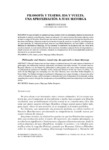Filosofía y teatro, ida y vuelta. Una aproximación a Juan Mayorga

Use este enlace para citar
http://hdl.handle.net/2183/28431
Excepto si se señala otra cosa, la licencia del ítem se describe como Atribución-NoComercial-SinDerivadas 3.0 España
Colecciones
- Investigación (FFIL) [877]
Metadatos
Mostrar el registro completo del ítemTítulo
Filosofía y teatro, ida y vuelta. Una aproximación a Juan MayorgaTítulo(s) alternativo(s)
Philosophy and theatre, round trip. An approach to Juan MayorgaAutor(es)
Fecha
2020Cita bibliográfica
Sucasas, A. (2021). Filosofía y teatro, ida y vuelta. Una aproximación a Juan Mayorga. Pensamiento. Revista De Investigación E Información Filosófica, 76(291 Extra), 1079-1100. https://doi.org/10.14422/pen.v76.i291.y2020.013
Resumen
[Resumen] Aunque el teatro no siempre se haya contado entre los principales objetos de atención de la filosofía, la relación entre filosofía y teatro es relevante. Por varios motivos: frecuente reflexión sobre el teatro a cargo de filósofos; filósofos que han escrito teatro; presencia de interrogantes filosóficos en las obras dramáticas; influencia recíproca de las dos formas de escritura. La obra de Juan Mayorga es un caso ejemplar. Su influencia principal, más aún que Walter Benjamin, es Franz Kafka. La herencia kafkiana se manifiesta en Mayorga, de dos maneras: formalmente, en la práctica de una «ética de la escritura teatral», la cual intenta eliminar de la escritura dramática cualquier forma de dogmatismo; y
desde el punto de vista del contenido, mediante la omnipresencia de la intersubjetividad poderoso/impotente en su escena teatral [Abstract] Although theatre has not been always considered among the main objects of attention of philosophy, the relationship between philosophy and theatre has been relevant. For several reasons: frequent reflection on the theatre by philosophers; philosophers who have written theatre; presence of philosophical questions in dramatic works; reciprocal influence of the two forms of writing. The work of Juan Mayorga is an exemplary one. His main influence, even more than Walter Benjamin, is Franz Kafka. The Kafkian heritage is manifested in Mayorga in two ways: formally, in the practice of an «ethic of theatrical writing», which attempts to eliminate any form of dogmatism from dramatic writing;
regarding the content, through the omnipresence of powerfull/impotent intersubjectivity in its theatrical scene.
Palabras clave
Teatro
Poder
Juan Mayorga
Franz Kafka
Walter Benjamin
Theatre
Power
Poder
Juan Mayorga
Franz Kafka
Walter Benjamin
Theatre
Power
Versión del editor
Derechos
Atribución-NoComercial-SinDerivadas 3.0 España
ISSN
0031-4749
2386-5822) digital
2386-5822) digital






